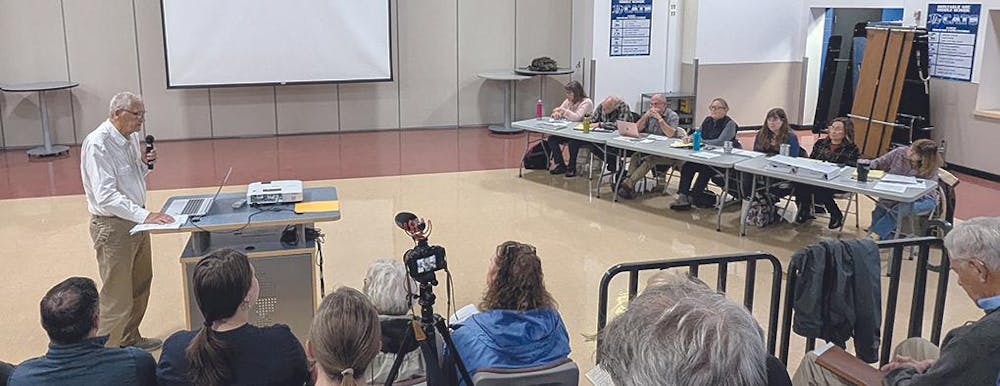MONTAGUE — Many turned out to NBC Middle School to share thoughts on the proposed Lakeside Solar energy facility during Tuesday's public hearing on the matter.
The White River Township planning commission hosted the hearing at the school to accommodate the crowds, and over three dozen people offered public comment about the project following a brief presentation from Amber Miller, Geronimo Power's director of permitting. (Geronimo is the parent company of Lakeside Solar.) Miller's presentation referenced the company's special use permit application, which is viewable at geronimopower.com.
The planned 1,575-acre project - 982 acres of which are used by the solar panels themselves, Miller said - would, according to the company, produce some $40 million in economic benefit to the area over the next 20 years, as well as 150 megawatts of energy that would be connected to the state's power grid. Over 200 temporary construction jobs would be created to build the energy facility, and three full-time positions would be used to oversee the project once completed.
The application was submitted Sept. 16, and the township has 120 days to render a decision, with a Jan. 14 deadline. Following the public hearing, the commission said that zoning administrator Bill Schmiege requested a 12-day extension due to the holiday season being part of that 120-day window, but that request was denied. Planning commission chair Lauren Wackernagel proposed a Dec. 2 special meeting in order to set a date for a final vote on the project.
If the commission was to vote down the application, Public Act 233 allows Lakeside Solar to appeal to the Michigan Public Services Commission, which has final siting approval if it deems a municipality's renewable energy requirements are more restrictive than the state's.
Of the many public commenters, three offered support for the project, including Kurt Guter, owner of Guter Farms in Montague, who said his is among the land being leased to Lakeside Solar. Guter worked for decades in renewable energy, including as president of Granger Waste Services, and said he was part of an unsuccessful attempt to bring a wind energy project to Muskegon and Oceana counties in 2010. He cited his rights as a landowner to work with Lakeside Solar and climate change concerns as reasons to support the project. Others to speak in favor were Michigan climate activist Peter Sinclair and local farm owner Paul Schroeder.
Most of the remainder of the comments were against the project, many citing what they viewed as the excessive size of the facility. Some comments pointed to the renewable energy overlay the township placed on Chemours land, which is about 500 acres, as an alternative, though Lakeside Solar has stated that for logistical and financial reasons, that site is not viable for its project. However, multiple residents claimed those reasons are not the township's to solve, and a couple contrasted this proposal with that of the 1,900-acre facility currently in development in southern Muskegon County, which is using a sparsely populated wastewater site.
"This is home, not an industrial site," local landowner Matt Hedges said, adding his land would be adjacent to some of the project. "Size and location matter."
Others cited the disruption a lengthy construction process would create in the township as a reason not to support the application, and several claimed the project does not fit within the township's master plan, which calls for preservation of the township's pastoral setting.
Claybanks Township resident Jason Rice, a local Coldwell Banker real estate agent, stated that in his recent experience, the uncertainty surrounding the solar facility is affecting interest in real estate in the township and if approved, would likely have adverse effects on local property values. Joe Ricenec, a real estate consultant who was part of July's public engagement session, previously said he'd seen no significant link either way between property values and nearby solar energy facilities.
Other notable comments in opposition came from county commissioner Kim Cyr, a Blue Lake Township resident, who cited the decrease in American farms as an issue and was against losing more farmland; Montague school board vice-president Joel Smith, who said he supports landowner rights but stressed this is a zoning issue; environmental ecologist Gary Fahnenstiel, who said he doesn't believe the project will have a significant impact in slowing down climate change; and Scott Roodvoets, who spoke on behalf of himself and his late father David, a Chemours Environmental Impact Committee member, as being against the project based on previous experiences with companies like Hooker and the proposal's use of agricultural land rather than brownfields.
Roodvoets added that he doesn't believe Hooker and duPont knew the negative consequences that would result when they came to the area and doesn't ascribe those motives to Lakeside Solar either, but cited potential adverse consequences as a reason to vote against the project.













